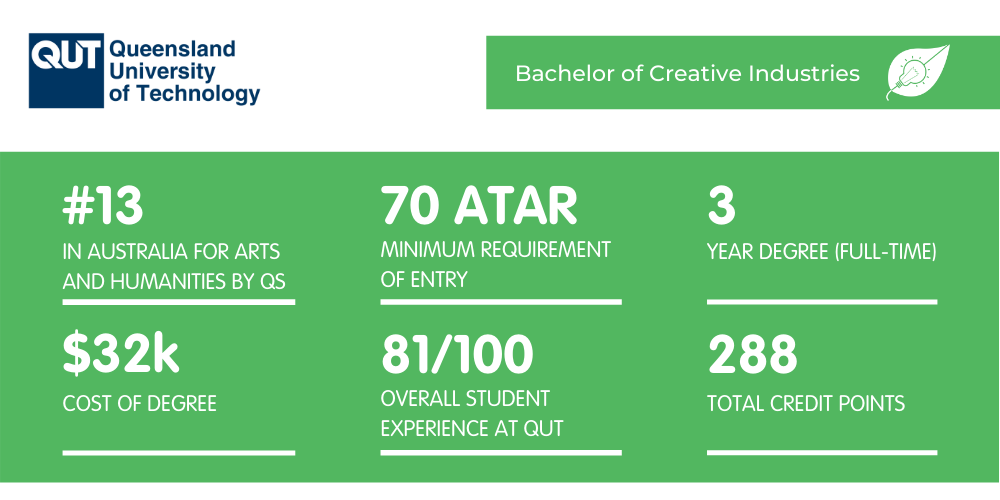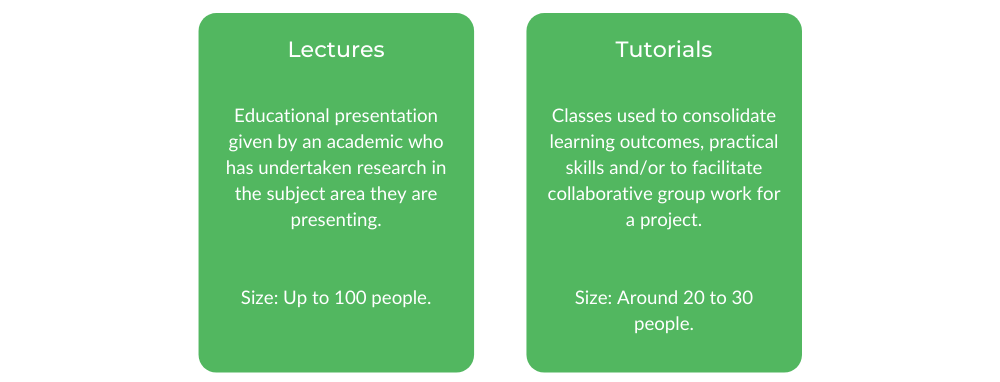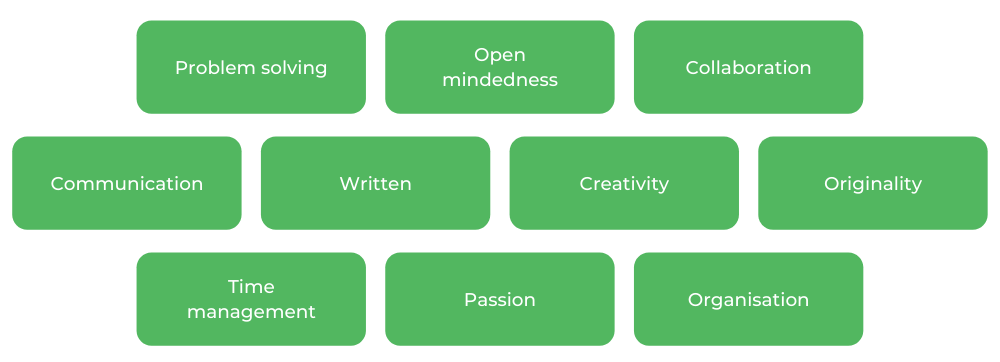Wondering what it would be like to study a Bachelor of Creative Industries at QUT? Maybe you’ve even envisioned the prospect for yourself!
Either way, you’ve come to the perfect place!
We’ve compiled everything there is to know about the units, culture, assessments and what it’s really like to study a Bachelor of Creative Industries at QUT.
Let’s begin!
What is a Bachelor of Creative Industries at QUT?
Core Units and Majors
How to Get into a Bachelor of Creative Industries at QUT
What’s the Teaching Format?
What’s the Faculty and Culture Like?
What is a Bachelor of Creative Industries at QUT?
The Creative Industries is a broad term that encompasses the creative arts, performing arts, film, publishing, music, game design, visual arts and virtually every other creative profession. The creative industries are responsible for producing modern artistic, cultural and functional designs, performances and activities.
The degree covers an extremely diverse field and is all about finding and unlocking your creative potential.
In a Bachelor of Creative Industries at QUT, you’ll be able to experiment creatively with the choice of a range of majors. So, while the Creative Industries is an unlimited field and it’s rather difficult to define in a few sentences, it’s all about giving you plenty of opportunities to develop your theoretical and practical skills to discover your own creative speciality.
As a student at QUT, you’ll have access to the new Creative Industries Precinct which includes performance spaces, visual art galleries and music studios. So, no matter what you specialise in, you’ll have access to resources that effectively facilitate this learning!
Can you study this degree in conjunction with another?
Sure can! A double degree with a Bachelor of Creative Industries at QUT is a great path for students that want to fast-track their learning, increase employability, enhance career flexibility or just for those undergrad students having trouble specialising with a single degree.
Studying a Bachelor of Creative Industries in conjunction with another undergrad degree would just involve a lot more work to stay on top of everything. Some of the double degree options that QUT offers Creative Industries students include:
-
- Bachelor of Business
- Bachelor of Data Science
- Bachelor of Human Services
- Bachelor of Information Technology
- Bachelor of Laws
You can take a look at all of QUT’s double degree options here!
Career Paths
Since the Bachelor of Creative Industries at QUT offers a diverse scope of majors and different ways to specialise, your career goals will usually be totally dependent on your major choice. No matter what you choose to pursue, a Bachelor of Creative Industries will teach the creative skills and knowledge to work within and beyond the creative industries!
Some professions may include:
-
- Graphic Designer
- Branding Specialist
- Communication Strategist
- Creative Writer
- Digital Content Producer
- Events and Festivals Coordinator
- Fashion Marketer
- Media Producer
- Music Publisher
- Publicist
- Stage Manager
- Theatre Professional
- Web Designer
So, you’ve got a lot of options. Again, your career choice will usually depend on what major you choose which we’ll hash out now!
Core Units and Majors
To successfully graduate from the Bachelor of Creative Industries degree at QUT, you’ll need to complete a total of 288 credit points.
A credit point is the way that universities measure the workload of particular subjects. Most of your units will be about 12 credit points each meaning there’s approximately 24 subjects that you’ll complete over 3 years with 4 subjects in a standard semester.
These credit points are broken up into 4 distinct categories. These include your core units, Creative Industries introductory units, your major and complementary studies. We’ll delve deeper into these categories right… now!
What are the Core Units?
In a Bachelor of Creative Industries at QUT, you’ll have 72 credit points worth of core units to complete. This means that over your 3-year degree, you’ll take 6 core unit subjects. These will be spread out throughout your study plan. These will include:
| Core Unit | Description |
|---|---|
| Creative Futures | This unit introduces the discipline of the creative industries. You’ll investigate potential career opportunities, develop essential literary skills, gain written skills for academic and professional contexts and form the traits and strategies needed to work in the creative industries. |
| Creative Enterprise Studio 1 | In this subject, you’ll gain a foundational understanding of project development, management, project delivery and prototyping your own creative ideas. |
| Creative Enterprise Studio 2 | This unit further develops the skills that you’ve gained in Creative Enterprise Studio 1. In this subject, you’ll enhance your project development skills with field analysis, creative experimentation, communication, project evaluation and problem solving. |
| Creative Enterprise and Entrepreneurship | This core unit will teach the transformation of creative ideas into viable creative enterprises. You’ll develop your entrepreneurial mindset and identify opportunities that address real world issues. |
| Creative Enterprise Studio 3 | In this final core subject, you’ll create a project that’s linked to the industry. By combining theoretical and practical tools, you’ll create a project proposal in response to an identified opportunity. |
You can scroll through QUT’s Bachelor of Creative Industries handbook right here!
Creative Industries Introductory Units
To complement your degree and gain a foundational understanding of creative industries, QUT offers students 24 credit points (or 2 subjects) worth of introductory units. You can choose from:
-
- Media Issues and Debates
- Introduction to Communication
- Introduction to Media and Entertainment Industries
- Managing Social Media
- Understanding Audiences
- Introduction to Fashion Communication
- Fashion Visualisation
- Visual Communication Design
- Introduction to Web design
- Music Production
- Introduction to Screen Production
- Plays that Changed the World
- Writing the Short Story
- Diverse Theatre Practice
- Engaging with Indigenous Perspectives: Respectful Engagement
- Engaging with Indigenous Perspectives: Understanding Rights
Majors
Because this degree is so customisable, there are plenty of majors to choose from. You’ve got 96 credit points for your major and your options will include:
-
- Creative and Professional Writing
- Media and Communication
- Drama and Performance
- Entertainment
- Fashion Communication
- Interactive and Visual Design
- Music and Sound
- Screen Content Production
Interested to know if QUT is one of the Top Art and Design Schools in Australia? Read our article here.
Complementary Studies
Here’s where it gets a little tricky. Your leftover 96 credit points can be used in 3 ways.
You can either choose a second major for 96 credit points, select two 48 credit point minors or one 48 credit point minor and four subjects of electives. So, this bit is really up to you.
There’s a huge list of minor options, some of them include:
-
- Art and Design History
- Creative Writing
- Character Animation
- Design and Visual Storytelling for Animation
- Drama
- Entertainment
- Fashion Communication
- Graphic Design
- Scriptwriting
- Journalism
- Performance Events and Festivals
- Writing, Publishing Editing
You can check them all out for yourself by scrolling down to page 22 here!
There you have it! These are the kinds of subjects that you can expect to complete in the Bachelor of Creative Industries course at QUT.
Is there a built-in internship program?
Yep! QUT understands the value of professional experience for your own competitive advantage and skillset and it also looks fab on a resume.
In your final year of studying a Bachelor of Creative Industries at QUT, you’ll have the opportunity to take 2 Work Integrated Learning (WIL) subjects.
You’ll focus on developing valuable and transferable skills by working on projects with industry partners like the Starlight Children’s Foundation Australia, World Science Festival, Brisbane Open House, Australian Parents for Climate Action and Beyond Zero Emissions.
So, you’ll take the classes: Work Integrated Learning 1 and Work Integrated Learning 2 where you’ll undergo your studies and receive academic credit in a workplace by participating, observing and reflecting! Fun!
How to Get into a Bachelor of Creative Industries at QUT
To be guaranteed entry into the Bachelor of Creative Industries program at QUT, you’ll need to achieve a minimum ATAR of 70. If you haven’t quite gotten this mark, don’t fear, there are other ways in!
First, you should check whether you’re eligible for an ATAR adjustment through QUT. You’re able to apply for as many adjustment schemes as you deem necessary and your ATAR can be adjusted by a max of 10 marks.
Some of the adjustment scheme factors include:
-
- Students with difficult circumstances (difficult home environment, financial hardship, experienced illness or disability or a disrupted education)
- Elite Athlete Entry Scheme
- Year 12 subject scheme
You can have a more extensive look at these options right here!
If you’re an Aboriginal or Torres Strait Islander student, you may be eligible to apply through QUT’s Centralised Assessment Selection Process.
Early Entry
QUT does offer early entry schemes for Year 12 graduates. So, if you’re in the process of completing your final exams and already know what you’d like to do at uni or if you’d like to relieve a bit of pressure on results day, then applying for early entry may be a perfect option for you.
You can take a look at QUT’s Early Offer Scheme options here!
Is there any assumed knowledge or prerequisite subjects?
The Bachelor of Creative Industries at QUT doesn’t require any particular Year 12 subjects. Although it is assumed that you’ve completed Year 12 English or Extension English.
It also wouldn’t hurt, if you’re choosing Year 11 and 12 subjects, to chuck in some design subjects like Visual Arts, Design and Technology or Woodwork — but again, these aren’t required!
Scholarships
QUT offers its potential students a wide scope of scholarships for a variety of different reasons. Some of the options for Creatives Industries students include the:
-
- Jane Pitman Interior Architecture Scholarship
- Tara Simmons Scholarship
- QIC Indigenous Tertiary Scholarship
- The John Stainton Scholarship
- Equity Scholarship
- Rural and Regional Enterprise Scholarship
There are plenty of options which you can check out for yourself here. QUT is looking for students from a diverse range of backgrounds, so if studying is what you want to do, go for it!
What’s the Teaching Format?
You can expect to undergo your studies in a two-semester format as a Bachelor of Creative Industries student. This means that you’ll be studying in two main sessions a year with some pretty generous holidays in between.
So, if you’re someone that prioritises longer holidays to work, get extra credit or just to refresh, the semester system may be perfect for you!
Class Structure
The Bachelor of Creative Industries is taught through lectures and tutorials. This means that for each of the subjects you take, you can expect to go to 1 lecture and 1 tutorial a week.
Both tutorials and lectures will go from an hour to 2 hours depending on the weekly material and how far through your degree you are. This means that you can expect to be spending about 15 hours a week on campus.
This will account for all your classes as well as ideally some independent study where you can consolidate your knowledge and stay on top of the content! Win win.
Lectures
As we mentioned above, lectures at QUT will usually last in between 1 to 2 hours. You’ll be attending a lecture for each of your weekly subjects which means you can expect to have to go to 4 lectures each week.
A lecture will involve the lecturer (this might be the head of the subject, a tutor or a special guest) discussing the content that is being shown on a powerpoint. There’ll be about 100 students in a lecture theatre at a time although this will definitely vary depending on whether it’s a lecture for a core subject, elective or major.
Lectures take quite a passive approach, however you’re expected to use the time to take notes and get any questions you might have ready for upcoming lectures. Lectures will usually inform future tutorials.
Tutorials
Similar to lectures, you’ll be attending 4 tutorials each week, 1 for each class. These classes will last, again, between 1 to 2 hours and will have about 20 to 30 students in each tutorial.
Tutorials are designed to provide students with an engaging and participative session where the tutor will guide students through the lesson and you’ll get plenty of chances to initiate discussions, ask questions and work in groups. It’s a great place to meet some pals and develop your communication, collaboration and confidence!
Assessments
Your assessments as a Bachelor of Creative Industries student at QUT will vary depending on the unit, your major and the format of the particular class.
There you have it. Of course this still depends on the subjects and majors you choose, but for the most part, as a Creative Industries student, you can expect to be graded on practical, hands-on assignments as opposed to exams.
Skills That You Refine and Learn
Since the Bachelor of Creative Industries at QUT is an extremely broad degree, you’ll develop skills in so many different areas. This means that you’ll gain a wide scope of professional, transferable and valuable skills that will be appreciated in any sector!
Some of these skills include:
-
- Problem solving
- Open mindedness
- Collaboration
- Communication
- Written skills
- Creativity
- Originality
- Time management
- Passion
- Organisation
Particularly if you want to work in creative industries once you graduate, creativity and the ability to innovate is going to be critical.
When you’re looking for a job, you’ll usually be required to present a portfolio that showcases your work, projects and ideas. So, try and remember this as you’re studying because you could use any of your assignments and projects to show future employers.
A lot of the time your uni projects will involve working to deadlines and staying on track, so time management and organisation are going to be important skills to develop.
With this in mind, you won’t have all these skills right away — and that’s okay! They’re all traits and abilities that you’ll develop as you study, work and gain general experience.
“I definitely developed problem solving — that’s the biggest one because regardless if you do entertainment industries as your major, one of the things that they do a really good job teaching in creatives industries is thinking outside of the box and learning how to apply your creative practice to not just things that are creative.
I think also having a broader world view, not being very narrow minded, it helps you be a lot more understanding and open.” — Naomi Feeney
What’s the Faculty and Culture Like?
As a student in the Bachelor of Creative Industries course, you’ll fit right into the suitably titled, Creative Industries Faculty!
The Creative Industries Faculty at QUT is a team of experienced researchers, industry experts and skilled staff who are always willing to give you a hand, help with inspiration or provide general support.
Because of the creative diversity of this degree, you can expect to meet a range of different people from a variety of different backgrounds and different interests! You can be confident that you’ll find people that you get along with and share similar interests with.
Creative Industries students are a group of creative, passionate and funky students who provide a great support system for other students.
Clubs and Societies
Even if you don’t find your people in your actual classes, there are plenty of other chances to meet students with similar interests to you! This especially applies to the huge variety of clubs and societies that QUT has on offer.
Maybe you’d like to join the Creative Industries Society, School of Design Club or the Theatre Company.
Maybe you’d like to broaden your experiences by becoming a part of the Red Cross Club, Consulting Society, Get Psyched Club or maybe you’d like to unleash your weird and wacky side by choosing one of the special interest clubs like the Anime & Manga Group, Bubble Tea Club, Dog Lovers Society or Film Club! You think of a discipline and QUT will most likely have a club for it.
You can check all of these out for yourself here!
Resources
As a current or future student at QUT, you’ll have access to a range of academic help and support services. You can check out QUT’s Resources for students page to check out any upcoming webinars, student stories and course videos, access library resources, tour the campus or subscribe to reminders and updates from QUT.
QUT is also always there for students who are looking for some wellbeing support. Whether you’re looking for counselling services, medical assistance, disability support, financial help, LGBTIQA+ support or language and study support — QUT has got you covered. You can have a deeper look at QUT’s support for students page here!
Gemma Billington is a Content Writer at Art of Smart and an undergraduate student at the University of Technology Sydney. While studying Journalism and Social and Political Sciences, Gemma enjoys spending her time at the gym or reading about Britain’s medieval monarchy – ideally not at the same time. She currently creates and administers social media posts for Central News and writes for the student publication, The Comma. After completing her undergraduate degree, she hopes to study a Masters of Medieval History and is very excited about the prospect!






